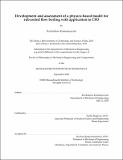Development and assessment of a physics-based model for subcooled flow boiling with application to CFD
Author(s)
Kommajosyula, Ravikishore.
Download1227042244-MIT.pdf (19.54Mb)
Other Contributors
Massachusetts Institute of Technology. Department of Mechanical Engineering.
Advisor
Emilio Baglietto.
Terms of use
Metadata
Show full item recordAbstract
Boiling is an extremely efficient mode of heat transfer and is the preferred heat removal mechanism in power systems in general and, more recently, in electronics cooling. Physics-based models that describe boiling heat transfer, when coupled with Computational Fluid Dynamics (CFD), can be an invaluable tool to increase the performance of such systems. Existing modeling approaches do not incorporate all relevant heat transfer mechanisms at the wall, limiting their predictive capability and general applicability. These shortcomings restrict the application of CFD in the design process. For the nuclear industry, this means having to rely on expensive experimental campaigns to develop and license new reactor designs. A second-generation mechanistic heat flux partitioning framework developed in our group provides an enhanced physical description of flow boiling. It introduces several mechanisms not accounted for in previous formulations, such as 1) bubbles sliding on the heater surface, 2) interaction of nucleation sites and 3) microlayer evaporation. The framework requires describing the complete bubble ebullition cycle, including bubble nucleation, growth, and departure through closure models, which are currently lacking. This thesis extends the framework into a closed-formulation by developing closure models that adequately represent the underlying physics. New models for predicting the bubble departure diameter and frequency are developed based on insights gathered from experiments and direct numerical simulations. An assessment against existing approaches to model boiling heat transfer demonstrates the model's ability to predict over 80% of the boiling curves within a 20% error, while also capturing the correct trends with flow conditions. The model implementation in a commercial CFD software is demonstrated using data from the Bartolomei experiment. The extendability of the model to novel heater surfaces is further demonstrated for a sapphire heater substrate, where fewer cavities for nucleation shift the boiling curves to considerably higher wall superheats. This mechanistic representation of boiling heat transfer has the potential to support predictive design with optimal boiling heat transfer for improved system efficiency, with the specific objective to accelerate the development of novel nuclear fuel concepts.
Description
Thesis: Ph. D. in Mechanical Engineering and Computation, Massachusetts Institute of Technology, Department of Mechanical Engineering, 2020 Cataloged from student-submitted PDF of thesis. Includes bibliographical references (pages 113-119).
Date issued
2020Department
Massachusetts Institute of Technology. Department of Mechanical EngineeringPublisher
Massachusetts Institute of Technology
Keywords
Mechanical Engineering.